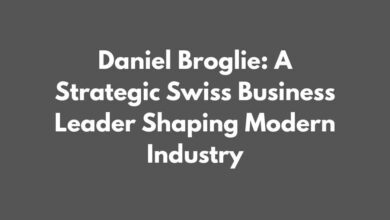Clive Humby: The Visionary Who Turned Data into a Global Business Asset

Clive Humby is a British mathematician, entrepreneur, and one of the most influential figures in the world of data analytics. Best known for coining the phrase “Data is the new oil” and for his pivotal role in developing the Tesco Clubcard, Humby has shaped the way businesses around the world view, collect, and use customer information. His ability to transform raw data into valuable insights has made him a pioneer in the fields of consumer loyalty, market segmentation, and retail innovation.
Early Life and Education
Born on 3 February 1955 in Leicester, England, Clive Robert Humby showed an early aptitude for mathematics. He attended local schools before securing a place at the University of Sheffield, where he studied Applied Mathematics and Computer Science. This combination of disciplines was rare at the time, yet it perfectly positioned him to be at the forefront of the coming information age.
His university years not only honed his analytical skills but also introduced him to computer systems that were far ahead of what most organisations were using in the 1970s. Humby graduated with the technical expertise and logical thinking that would define his later career.
The First Steps into Data Science
In 1976, Humby joined CACI, a US-based market analysis company that had operations in the UK. His work involved developing statistical models to analyse the UK census, and he played an important role in creating the ACORN classification system. This system segmented households into different categories based on demographic and geographic data, allowing businesses and organisations to target their services more effectively.
The ACORN project demonstrated to Humby the power of data in predicting behaviour and identifying patterns. This insight would later become the foundation for his career-defining achievements.
Founding of dunnhumby
In 1989, Clive Humby and his wife, Edwina Dunn, took a bold step and founded dunnhumby, a customer data science company. The aim was simple yet revolutionary: help businesses understand their customers by turning raw transaction data into actionable insights.
At the time, many companies collected data but had no idea how to use it effectively. Dunnhumby’s approach was different—it focused on building a full picture of customer behaviour. This involved analysing purchasing habits, identifying preferences, and predicting future needs. The company’s work was built on the principle that understanding the customer on an individual level was the key to long-term business success.
Partnership with Tesco and the Birth of Clubcard
The turning point for dunnhumby came in the early 1990s when Tesco, one of the UK’s largest supermarket chains, approached the company. Tesco wanted a loyalty programme that would not only reward customers but also provide deep insights into their shopping habits.
In 1995, the Tesco Clubcard was launched. Unlike previous loyalty schemes, the Clubcard collected detailed information on every purchase made by its members. Dunnhumby’s analytics transformed this data into targeted marketing campaigns, personalised offers, and store improvements tailored to customer preferences.
The results were extraordinary. Within a year, Tesco saw a sharp increase in market share and customer loyalty. Competitors were left scrambling to catch up, and the Clubcard became a benchmark for loyalty programmes worldwide.
“Data is the New Oil” – A Landmark Phrase
In 2006, Clive Humby made a statement that would become one of the most quoted phrases in the digital era: “Data is the new oil.” His meaning was clear—like crude oil, raw data is useless until it is refined. Just as oil must be processed to create fuel, data must be analysed, interpreted, and applied to generate value.
This analogy captured the essence of the data revolution and helped companies around the world grasp the economic potential of information. The phrase continues to be used in discussions about big data, artificial intelligence, and the digital economy.
Expansion and Global Reach
Under Humby’s leadership, dunnhumby grew rapidly. The company expanded internationally, working with retailers, financial institutions, and consumer brands in markets such as the United States, Europe, and Asia. By applying the same analytical principles that had worked for Tesco, dunnhumby helped organisations around the world increase sales, improve customer satisfaction, and build brand loyalty.
The company’s success attracted significant interest, and in 2011 Tesco completed its acquisition of dunnhumby. While Humby and Dunn eventually stepped down from their roles, their legacy continued to shape the company’s operations and influence the wider industry.
Later Career and New Ventures
After leaving dunnhumby, Clive Humby and Edwina Dunn co-founded H&D Ventures, a business consultancy specialising in data-driven growth strategies. In 2014, Humby became Chief Data Scientist at Starcount, a company focused on understanding consumer behaviour through social media analytics.
Starcount’s work extended Humby’s mission of using data to understand people better. Instead of looking solely at transactional data, the company also examined online conversations, social media interactions, and cultural trends. This holistic approach offered a richer understanding of consumer motivations and preferences.
Recognition and Awards
Humby’s contributions to business and data science have earned him numerous honours. In 2019, he was appointed Officer of the Order of the British Empire (OBE) for services to data and business. He has also received honorary doctorates from several universities and has served as a Visiting Professor of Data Science at the University of Sheffield.
In 2024, he was awarded the Don Schultz Award for Integrated Marketing Communications, recognising his groundbreaking work in uniting marketing strategy with data analysis.
The Business Philosophy of Clive Humby
At the heart of Clive Humby’s philosophy is the belief that businesses must treat customers as individuals, not statistics. His approach revolves around several key principles:
-
Customer-Centric Thinking – The customer’s needs, preferences, and behaviour should drive every business decision.
-
Data Refinement – Data in its raw form is not valuable until it is processed and understood.
-
Long-Term Relationships – Loyalty programmes should focus on building trust and lasting connections, not just short-term sales boosts.
-
Ethical Use of Data – Businesses must handle data responsibly, ensuring privacy and security for consumers.
These principles have not only influenced retail marketing but have also set standards for data usage in other industries such as banking, telecommunications, and healthcare.
Impact on Modern Marketing
The methods pioneered by Humby have changed the way marketing works. Today, personalisation is a standard expectation, with customers anticipating that brands will know their preferences and cater to them accordingly. The use of data-driven strategies has become a competitive necessity, not a luxury.
From targeted email campaigns to predictive stock management, the principles developed by Humby’s team at dunnhumby underpin many of the technologies and processes that define the modern retail experience.
Legacy and Influence
Clive Humby’s influence extends far beyond the companies he has worked with directly. His ideas have inspired an entire generation of data scientists, marketers, and business leaders to rethink how they interact with customers.
The Tesco Clubcard model has been replicated in countless countries and industries, from airline frequent flyer programmes to streaming service recommendation engines. His famous “Data is the new oil” quote remains a rallying cry for the digital economy, emphasising the immense value hidden in the information businesses collect every day.
Conclusion
Clive Humby’s career is a testament to the power of vision, innovation, and analytical thinking. From his early work with demographic data to creating one of the most successful loyalty programmes in history, Humby has transformed the way the world thinks about customers and data.
His belief that data must be refined to be valuable has shaped modern business practices, influencing not just retail but every sector that relies on understanding human behaviour. As technology continues to advance and the volume of available data grows, Humby’s insights remain as relevant today as they were when he first revolutionised the industry.



